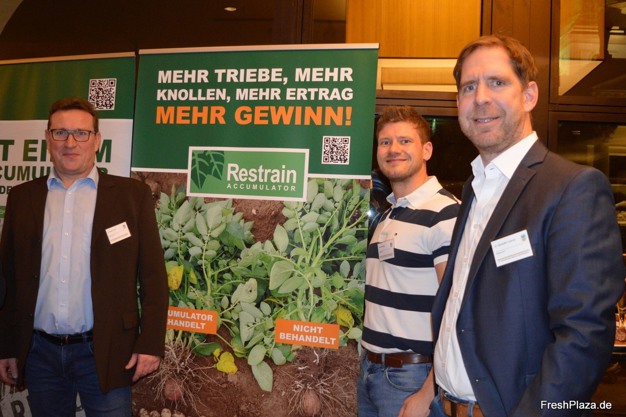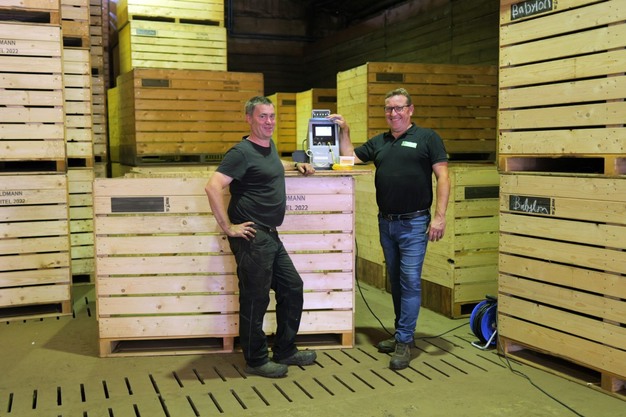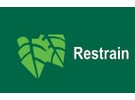On 3 September, Restrain Germany hosted a webinar on the use of ethylene-based sprout inhibitors in potato storage. The focus was on the newly developed 'Precision Ethylene Treatment' (PET) technology, an improved process for introducing and maintaining the correct ethylene level in potato storage, which has been proven to prevent sprouting, preserve the baking colour of the potatoes and minimise weight loss. The type of storage, whether box or flat storage, refrigerated or non-refrigerated, is irrelevant. The new solution will be available for the next harvest.
Improved and more precise performance
The decisive breakthrough has been achieved with the newly developed, exclusive ethylene sensor, which continuously and precisely measures and controls the ethylene concentration in the potato store. Carbon dioxide, temperature, and humidity are also recorded. Added to this is the ultra-low dosing pulse system. It can release ethylene in the store in a controlled manner at a concentration in the range of one billionth. It therefore works with extremely low dosing pulses for finer dispensing. The sensor reacts as soon as the determined actual value deviates from the target value. The Restrain software has a new control algorithm that enables smaller and more frequent dosing.

The Restrain Germany team at this year's potato evening in Berlin. From left to right: Andreas Fust, Jason Blakley and Dr Benedikt Cramer. The PET technology from Restrain - in future with real-time remote monitoring and adaptive storage control - can be easily integrated into existing systems.
The control management system ensures a precisely controlled, gradual increase - without stress for the stored goods: the potatoes react to this gentle introduction of the extremely low ethylene doses and change their metabolism without stress. As a result, the respiration rate of the tubers remains low as more ethylene is gradually added. The innovative system reliably avoids over- and underdosing. "Perfect germ control is achieved and the natural baking colour is retained. The colour reactions during frying have improved significantly thanks to the refined application technology," said Andreas Fust based on test results.
A patent application has been filed for this highly precise new technology. Restrain's PET technology is based on three revolutionary steps, namely a newly developed ethylene sensor, an innovative ultra-low dosing pulse system and a control system for ethylene management.
Maintaining quality and reducing weight loss
The introduction of the new PET technology is planned for the 2024/2025 storage season, which will not only further improve product quality but also reduce both costs and carbon dioxide emissions. The sensitive sensors detect even the smallest concentrations of ethylene and thus significantly reduce ethanol consumption. In addition, the modern generators with advanced fans ensure optimum ethylene distribution in the store, which increases efficiency and further reduces ethanol consumption. Ultimately, the new sensor technology as part of the PET system reduces ethanol consumption by up to 40 per cent and thus also protects the environment. The amount of operating resources required is reduced. Dr Benedikt Cramer from Restrain summarises the positive results: "The Restrain technology enables precise control of the ethylene level in the store and ensures that potatoes retain their quality and weight loss is reduced."

User Frank Feldmann (l) in conversation with Andreas Fust from Restrain. Ethylene is not only used to inhibit sprouting in storage potatoes and onions, but also to promote sprouting in seed potatoes and to stabilise ripening in tomatoes.
Frank Feldmann, potato farmer and convinced Restrain user, was also extremely satisfied with the practical results to date on his farm in Emsland. "We have been producing more and more French fries potatoes for McCain for a few years now and were looking for an alternative to inhibit sprouting. For me, it was particularly important that the solution was user-friendly, automated, and also affordable," says the 48-year-old farmer.
The French fries potatoes are usually stored in October. Ethylene treatment takes place immediately after storage. At the end of February/beginning of March, the potatoes are gradually removed from storage as required, after which the treatment process is completed accordingly. Feldmann: "The sprout inhibitor is now used not only for our main variety Fontana, but for all storage potatoes and my experience so far has been consistently positive, which is partly due to the excellent price-performance ratio."
Photo credit: Restrain Germany
For more information:
Restrain Germany
Andreas Fust
[email protected]
+49 160 91 86 12
Jason Blakley
[email protected]
+ 49 (0) 151 / 72537872
Frank Feldmann
Feldmann Potato Cultivation
Tel: +49 5906 9601-16
[email protected]










